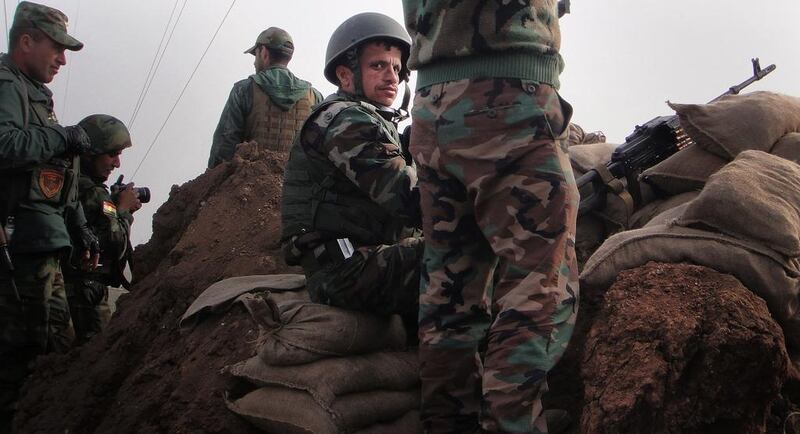ESKI MOSUL, IRAQ // An unarmed Sunni Arab man walked along a road in a patch of northern Iraq newly liberated from ISIL, holding a white surrender flag – a signal to Kurdish fighters that he is not a militant. Cars drove by, a similar white banner flying from their windows.
As they retake territory from ISIL militants, Iraqi Kurdish fighters have found surprising ambivalence in areas they freed from the militants’ oppressive rule.
Locals have swiftly shaken off the imposed Islamic lifestyle – but as Sunnis, from the same ethnic group as the militants, many are nonetheless bracing for treatment as collaborators.
For their part, the Kurdish peshmerga troops are suspicious about why the locals chose to stay on when ISIL conquered the area in a blitz last year.
The road to Mosul, a coveted prize in the battle for Iraq, was strewn with suspicion and fear.
The recent Kurdish push secured several towns and villages along a critical junction that connects the town of Tal Afar to the city of Mosul – two of the militant group’s biggest strongholds in Iraq. The artery, which eventually leads to Syria, has been a vital supply line for militants transporting weapons, goods and people across the lawless Iraq-Syria border.
Kurdish fighters had struggled for months to inch ahead, backed by US-led coalition airstrikes. On Tuesday, at least four airstrikes hit ISIL positions near Eski Mosul, a village of up to about 9,000 residents northwest of Mosul.
Kurdish Brig Gen Bahjat Taymes said seizing it was “crucial” because it also leads to the Mosul Dam, which Kurdish and Iraqi forces won back in August.
The villagers in Eski Mosul are grateful for their Kurdish liberators, many of whom speak almost no Arabic. But the Sunni villagers also know it will take time to convince the newcomers they hold no allegiance to the ISIL group.
Many in Eski Mosul admit they welcomed ISIL when the group first arrived, resentful of what they perceive as years of neglect, discrimination and sectarian policies by the Shiite-led government in Baghdad.
“We thought they were revolutionaries coming to help us and give us our rights,” said 30-year-old grocer, Salim Khudair.
Hard times followed. The village soon lost cooking gas and electricity, forcing the people to heat what little food remained over open ground fires. The cows became emaciated and many stopped giving milk. Most of the infants and the elderly became sickly.
Now, they can glimpse a better life emerging. Cigarettes – strictly banned under ISIL – are sold and smoked freely.
For the first time in months, women and young girls walk the narrow dirt streets without having to cover their faces. Young boys wrestle and play soccer without fear.
But mistrust lingers.
As several Kurdish fighters handed out bottled water, a group of village girls came up, timidly saying to the soldiers, “Please don’t blow up our homes.”
Shaimaa, a resident of Eski Mosul, said her brother-in-law supported the ISIL and so the Kurdish troops deemed her husband guilty by association and detained him.
Khudair, the grocer, claimed the peshmerga fighters confiscated some of his belongings, including a credit card machine he uses for work.
With the Islamic State still sporadically shelling the village, some Kurds worry the villagers are tipping off the militants about the Kurdish positions.
“We need them to trust us and to cooperate with us,” said Kurdish Col Marwan Al Mizouri who believes some villagers may still be loyal to the militants.
“Not all of them, but maybe 10 per cent. It is essential that we identify those people and take care of our backs before we continue.”
* Associated Press





